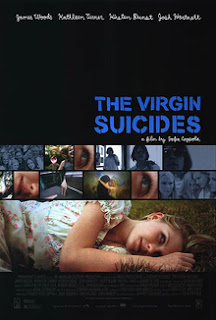The Virgin Suicides
The Virgin Suicides is included in Brian Raftery's book on 1999 films, but it's a bit of a cheat, since the film was not released commercially until 2000 (it premiered at the Cannes Film Festival in '99). It was Sofia Coppola's first film, though, and she has been an important American director over the last twenty years.
I've seen all of Coppola's films, but I'm not a big fan. I find her style anthropological, as she observes a certain type of person, but doesn't roll up her sleeves and get into it, remaining back a step. The only film that doesn't adhere to this is Lost In Translation, which is rumored to be about her own experiences.
The Virgin Suicides sets the pattern, as it is in its very nature about voyeurism. As with the book, it is narrated in the first person plural by a group of boys looking back on five mysterious sisters, all of whom commit suicide. During the story, the film examines the banality of suburban life.
I liked this film, but it has its limitations. The Lisbon sisters are unknowable, and thus the real leads of the pictures are the boys. We get hints at their home life--the dad (James Woods) is a kind of cliche, the dad who wants to be a good guy, while the mother (Kathleen Turner) is a religious zealot who would prefer to keep the girls under lock and key. The girls appear to be normal, given their circumstances, but the youngest slits her wrists. She is saved, but later jumps out a window and is impaled on a fence.
A good portion of the film is then given over to Trip Fontaine (Josh Hartnett), the Lothario of the school, who has eyes for Lux (Kirsten Dunst), probably because she pays him no attention. Eventually he wins her and the family over, getting his buddies to take them all out to the homecoming dance. But an assignation on the football field will lead to the girls' downfall.
The Virgin Suicides is presented in dreamy fashion, with excellent photography by Ed Lachman. Set in the mid-'70s, it also relies on nostalgia, with songs by Heart on the soundtrack. This was my time and place--suburban Detroit during the Ford administration. I did not, however, grow up across the street from five girls who become part of a myth.
I've seen all of Coppola's films, but I'm not a big fan. I find her style anthropological, as she observes a certain type of person, but doesn't roll up her sleeves and get into it, remaining back a step. The only film that doesn't adhere to this is Lost In Translation, which is rumored to be about her own experiences.
The Virgin Suicides sets the pattern, as it is in its very nature about voyeurism. As with the book, it is narrated in the first person plural by a group of boys looking back on five mysterious sisters, all of whom commit suicide. During the story, the film examines the banality of suburban life.
I liked this film, but it has its limitations. The Lisbon sisters are unknowable, and thus the real leads of the pictures are the boys. We get hints at their home life--the dad (James Woods) is a kind of cliche, the dad who wants to be a good guy, while the mother (Kathleen Turner) is a religious zealot who would prefer to keep the girls under lock and key. The girls appear to be normal, given their circumstances, but the youngest slits her wrists. She is saved, but later jumps out a window and is impaled on a fence.
A good portion of the film is then given over to Trip Fontaine (Josh Hartnett), the Lothario of the school, who has eyes for Lux (Kirsten Dunst), probably because she pays him no attention. Eventually he wins her and the family over, getting his buddies to take them all out to the homecoming dance. But an assignation on the football field will lead to the girls' downfall.
The Virgin Suicides is presented in dreamy fashion, with excellent photography by Ed Lachman. Set in the mid-'70s, it also relies on nostalgia, with songs by Heart on the soundtrack. This was my time and place--suburban Detroit during the Ford administration. I did not, however, grow up across the street from five girls who become part of a myth.



Comments
Post a Comment